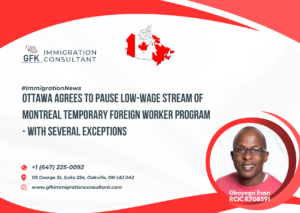
Ottawa has approved a Quebec government request to impose a six-month pause on new applications to the low-wage stream of the temporary foreign worker program in Montreal, but there are exemptions for several sectors, including food processing and construction.
Employment Minister Randy Boissonnault announced the decision on Tuesday. The pause will not apply to the construction, agriculture, food processing, education and social services sectors.
“Our government will closely monitor this policy change as it makes its own determinations about future changes to the TFWP,” Mr. Boissonnault said in a statement.
Canada’s temporary foreign worker program a ‘breeding ground’ for modern slavery, UN report concludes
The Temporary Foreign Worker Program has been around in one form or another over several decades. It has primarily been used by employers in the agriculture sector to cover seasonal labour pressures. However, a separate branch called the low-wage stream has grown sharply after the federal government loosened the rules in 2022 in response to calls from business groups warning of acute post-pandemic labour shortages in workplaces such as restaurants.
Mr. Boissonnault has previously signalled that Ottawa intends to scale back the use of that program stream. The Globe and Mail recently reported, citing two senior government sources, that Ottawa is planning to cut the low-wage stream of the temporary foreign worker program back to prepandemic levels.
Government records show Ottawa approved 83,643 temporary foreign worker positions in the low-wage stream in 2023, up from 28,121 in 2019, prior to the pandemic.
The pause on new applications and renewals will take effect on Sept. 3.
Quebec’s Immigration Minister Christine Fréchette said the low-wage stream applies to jobs that pay below $27 an hour. She said employers affected by the changes could choose to pay workers above that rate if they wish to renew a work permit.
Quebec Premier François Legault said the six-month pause would only apply to about 3,500 workers filling low-wage jobs on the island of Montreal. During a Tuesday news conference in Montreal, Mr. Legault acknowledged that this represents only a small fraction of Quebec temporary residents, which he said number about 600,000 in total.
Mr. Legault reiterated claims that temporary residents, including foreign workers and students, put a strain on the province’s health and social services and contribute to the housing crisis. He also said they threaten the French language, particularly in Montreal.
The premier repeated his long-standing demands that the federal government should reduce by half the number of temporary residents under its sole responsibility.
Mr. Legault also announced Tuesday that Quebec will table a bill this fall to give itself the power to limit the number of foreign students in Quebec, following what he described as abuses by certain institutions. Mr. Legault said this would not affect institutions in remote regions but declined to provide further details.
Opinion: The temporary foreign worker program is a scam, and almost everyone is in on it
The Chamber of Commerce of Metropolitan Montreal denounced the worker program pause, saying the policy move “does not take into account the reality of the integrated labour market in the metropolitan area,” Michel Leblanc, president and CEO of the Chamber of Commerce, said in a statement.
“The businesses most affected will be small businesses already facing challenges with liquidity, financing, supply, recruitment and retention of workers.”
The temporary foreign worker program was singled out for criticism in a recent United Nations report, which described it as a “breeding ground for contemporary forms of slavery.”
Business groups have pushed back on that criticism, rejecting the UN report as an over-the-top analysis that plays down the fact that the vast majority of placements are successful.
Nancy Healey, the federally-appointed Commissioner for Employers, released a statement last week saying that employer groups reject the notion that the program leads to slavery, criticizing the report as inflammatory.
The position of Commissioner for Employers involves representing the views of businesses affected by the federal government’s Employment Insurance program.
“In many instances, Canadian businesses would not be able to maintain production levels or standard hours of operations if it was not for the TFWs who are complementing the Canadian work force,” Ms. Healey said in a statement.

Ottawa agrees to pause low-wage stream.
GFK Immigration
Gboyega Esan RCIC R708591
Phone: +1 (647) 225-0092
#immigration #immigrationnews #news #blognews #canada #Pr #FamilySponsorship #GFKImmigration #ReuniteInCanada #ImmigrationExperts #FamilyFirst #CanadianDream #CanadaPR #CanadaBound #RelocateWithEase #canada #canadaimmigration #immigration #studyincanada #studyabroad #visa #ielts #canadapr #studentvisa #studyvisa #expressentry #immigrationconsultant #workpermit #visaconsultants #immigrationcanada #ImmigrationHelp #CanadaImmigration #LifeInCanada
